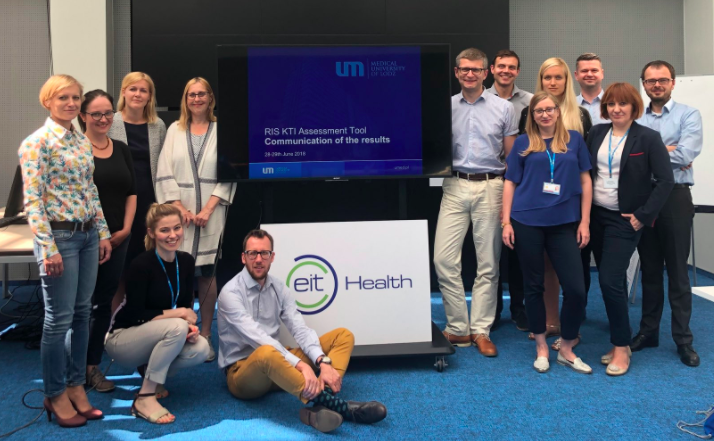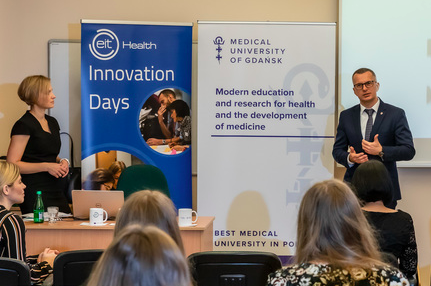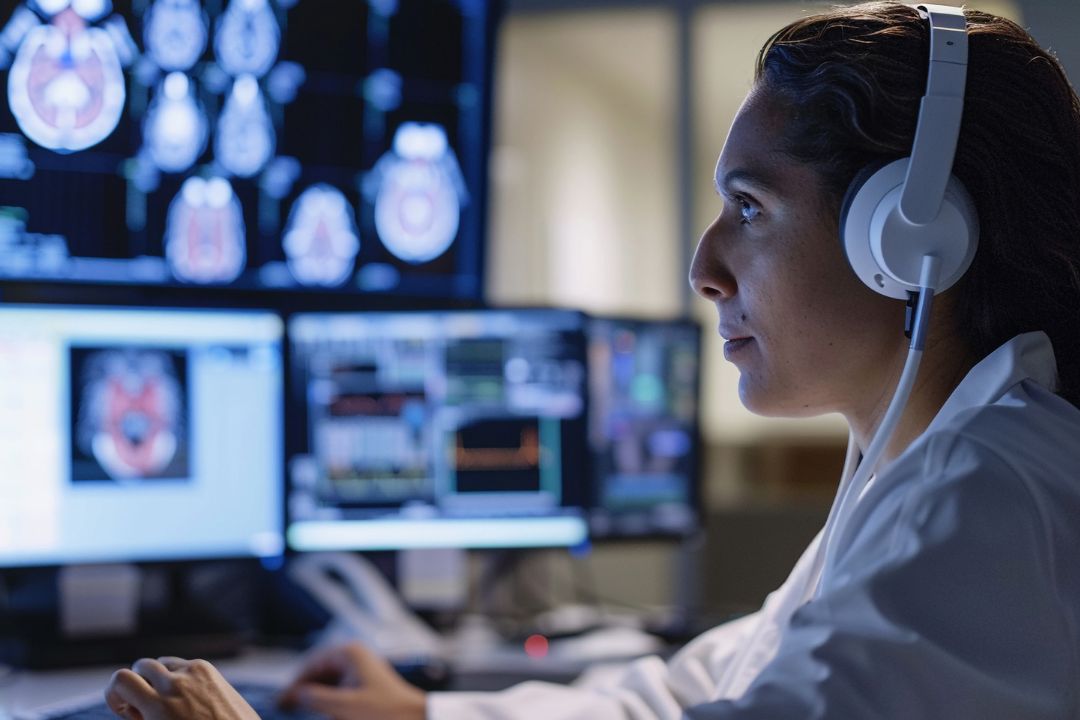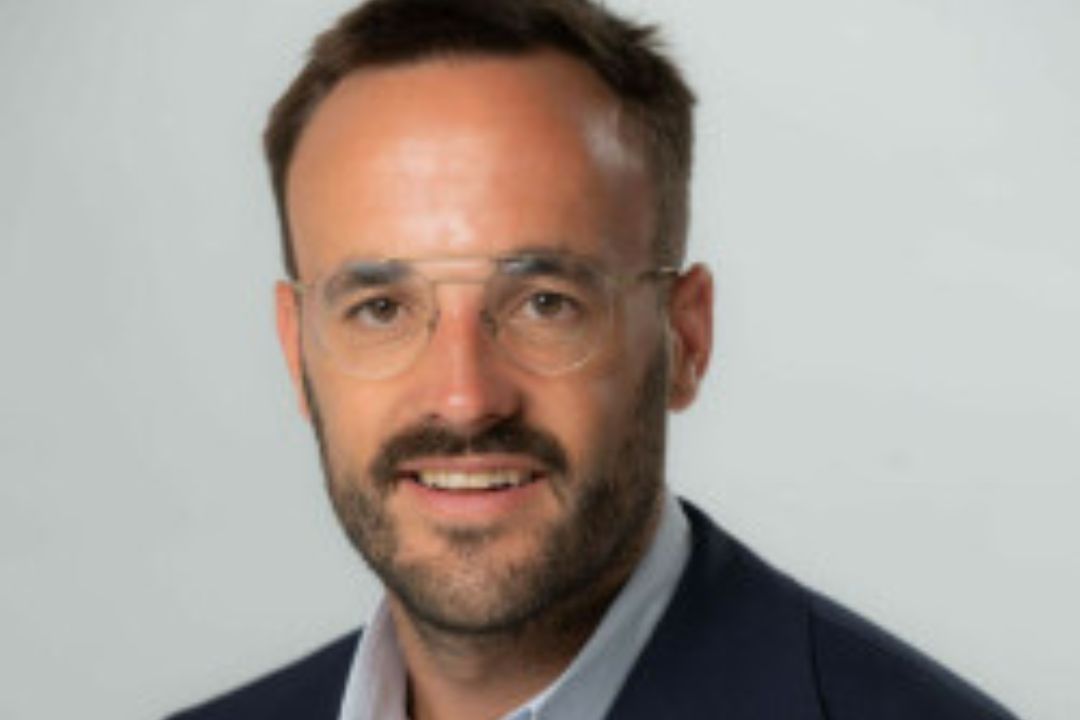28th September 2021
The article was prepared in cooperation with Artur Olesch and published in the Polish Healthcare Journal.
The story of Medical University of Gdańsk proves that the right network can untap the innovation potential not only in the academic centre, but also in the region.

Science and business depend on one another. Without a solid science base, commercial companies cannot design and develop new healthcare products and solutions. This also works the other way round – without the ability to collaborate with commercial companies and scale solutions on the market, even the best ideas of academics, research teams and university students may never leave the university walls.
Partnership and exchange of experience stimulate innovation
Silicon Valley might never have come to life without Stanford University. Similar to the British Oxford University and King’s College London, Swedish Karolinska Institutet and Swiss ETH Zürich are at the heart of the innovation hubs in Europe. Polish medical universities also wish to offer their students new opportunities to achieve their goals as innovators and entrepreneurs.
The Medical University of Gdańsk is such an entity – it is the first medical research university in Poland and one of the most advanced academic centres in the country. It educates high-class medical staff and strives to create a strategic innovation hub for the Pomerania region in Poland. In 2018, the university started the cooperation with EIT Health.
– When we started working with EIT Health in 2018 as an EIT Health Hub in RIS regions (Regional Innovation Scheme), our main priority was to build connection and innovation networks in the region. We have strengthened the cooperation with Polish Tricity’s science and technology parks and met start-ups that execute interesting medical projects. Based on that, new opportunities for start-ups and universities have emerged that allow them to establish cooperation with industry and other research centres in Europe – says Katarzyna Waligóra-Borek, PhD, head of the Centre for Technology Transfer at the Medical University of Gdańsk.
Together with other EIT Health Hubs in Europe, Medical University of Gdańsk has been strengthening skills in building technology transfer models, especially during study visits and countless trainings within the programme of the EIT Health Regional Innovation Scheme.
One of such training projects was Drive, aiming to equip regional leaders with expertise to boost their local innovation ecosystems and prepare innovation strategies. Other game-changer was i-Days, a pan-European cyclical event for students and PhDs interested in cross-disciplinary innovation. Medical University of Gdańsk involved other Pomeranian universities to jointly look for students’ projects that could be further developed in the region. This experience also triggered launching educational projects to inspire students and young innovators with the entrepreneurial and innovation mindset.
– To gain the possibility to apply for innovative scientific projects carried out in wide European partnerships within EIT Health, we decided to apply for the role of EIT Health partner – underlined Katarzyna Waligóra-Borek.
The partnership has opened new possibilities. Medical University of Gdańsk has joined From Scientists to Innovators for Industry – a 3-month course to orient young researchers towards collaboration with the industry. It is run in cooperation with academic and non-academic partners, including the Medical University of Łódź, Karolinska Institutet, University of Copenhagen, Roche, and Philips.
From research laboratories to the market
The Medical University of Gdańsk has also intensified support for spin-off companies created at the university more actively.
– Gp4Research, our spin-off company, entered the 2019 EIT Health Start-ups Meet Pharma competition and responded to Bayer’s challenge involving a telemedicine-based patient support programme – notes Katarzyna Waligóra-Borek and adds that the company implements an integrated patient-centered model that connects the clinical research industry with the basic healthcare infrastructure. The idea is that clinical trials, mainly carried out in hospitals, could be conducted closer to the patient, for instance, in primary care centres.
Creating a course of study together with the pharmaceutical companies – Polpharma and Oceanic – by the Medical University of Gdańsk is yet another way of connecting science and business. It made it possible to combine theoretical education with industrial practice. In this model, theoretical classes take place at the Medical University of Gdańsk, and the practical subjects are taught by professionals employed in the pharmaceutical and cosmetics industry. This study programme includes a 9-week internship in production plants and laboratories of the partner companies.
Katarzyna Waligóra-Borek also lists several programmes dedicated strictly to doctors. – HelloAI RIS, a series of training courses on the use of artificial intelligence in healthcare, was launched last year, and it was very popular among clinicians.
Progress is based on collaboration between technology and medicine

A new, open strategy of the Medical University of Gdańsk considers the importance of technology in the teaching activities at the university. Advances in knowledge and digitalisation are playing an increasingly important role in healthcare. As a result, medical education is also changing – before the digital revolution, it was exclusively focused on medical, biological, and physiological issues.
According to prof. Marcin Gruchała, rector of the Medical University of Gdańsk, the contemporary education should enable a future graduate to move freely in the world of technology and innovations and to skillfully adapt to the changing environment, especially the technological one.
– Today, technology plays an enormous role in diagnosis and therapy. Therefore, the collaboration between a doctor, a nurse, a medical technician and an engineer, a physicist (the medical industry in general) is essential. The ability to dialogue and understand each other is crucial, as the progress will be more often based on cooperation between the technological and business world and the medical world. These two worlds must get along, and universities must adjust.
The perception of medical education has considerably changed in recent years. Until recently, the assumption was that a medical student should learn everything by heart. Today, the scope of medical knowledge is so vast that it would be physically impossible. – If you wish to be a good doctor, nurse, technician, you must complement your knowledge gained during pre and postgraduate education and your specialisation with technology and solutions available thanks to computerisation, the internet, smartphones, and robotisation.
According to prof. Gruchała universities cannot deny the existence of the technological world. It can be a challenge for academics, however academic units are ready for technology transformation in healthcare. Students gain their medical skills in modern research hospitals with advanced technological solutions. There are world-class medical simulation centres at every university. Students can perfect various clinical activities in a virtual environment without excessive stress or putting patients at risk.
– I would venture a statement that the world of medical schools and teaching hospitals is, in many cases, more technologically and digitally advanced than the environment many graduates enter after their graduation. This way, through the transfer of skills and knowledge, they become an accelerator of change in the units they work for – underlined prof. Gruchała and added that technology makes it possible to strengthen the importance of teamwork and implement value-based healthcare principles. – Today, thanks to the free exchange of information and new solutions for patients, we can speak of real patient-centred care.
Technology is necessary for multiple medical and non-medical professionals to focus on their patients. Remote medical case conferences might be an example. – I participate in medical case conferences or multidisciplinary teams almost every day, where we discuss patient health conditions and determine the optimal path of medical management. Without the use of technology, it would be impossible. As prof. Gruchała adds, therefore, the focus can be put on the patient and not on the disease entity.
These benefits are noticed by patients and incorporated into their daily lives. Regardless of their age, many patients are doing very well in the world of e-prescriptions and e-referrals. The number of people registered on the e-health platform and using mobile applications is rising. On the one hand, the acceptance of technology in healthcare stems from the already present digitalisation in other areas of life. On the other hand, it results from the increasing availability of high-speed internet and mobile technology in the form of smartphones. The COVID-19 pandemic was an additional catalyst for advances in healthcare technologies. Medicine will depend heavily on digitalisation, virtual patient contact, automation, and artificial intelligence even more. The role of innovation will be to assist the patient in prevention or treatment, support physicians in the treatment process and their seamless access to the necessary data and provide health systems with solutions to help make better decisions relating to population health. Polish scientific entities have a crucial role, which requires an efficient combination of academic knowledge and research potential, supported by cooperation with business.
The Medical University of Gdańsk is a modern academic centre with high scientific and developmental potential. It is the only medical university selected to the elite group of the top 10 Polish universities awarded in the prestigious competition “Initiative of Excellence – Research University”. It is also the best medical university in Poland, according to the latest Perspektywy University Ranking. For over 75 years, it has provided quality education in all health professions. The university educates over 6000 students, PhD students and postgraduate students.
Artur Olesch is a digital health journalist, content writer and designer, blogger, advisor for med-tech companies, healthcare organisations, and start-ups.
New data shows AI innovation needs skills beyond coding

The largest live dataset of AI start-up talent analysed.
Europe's top health start-ups take centre stage: EIT Health Catapult winners are revealed at HLTH Europe

2025 Catapult programme winners announced.
Finding Europe’s next healthtech leaders: Insights from Antoine D’Hollander

Insights from Antoine D’Hollander, Capricorn Partners.